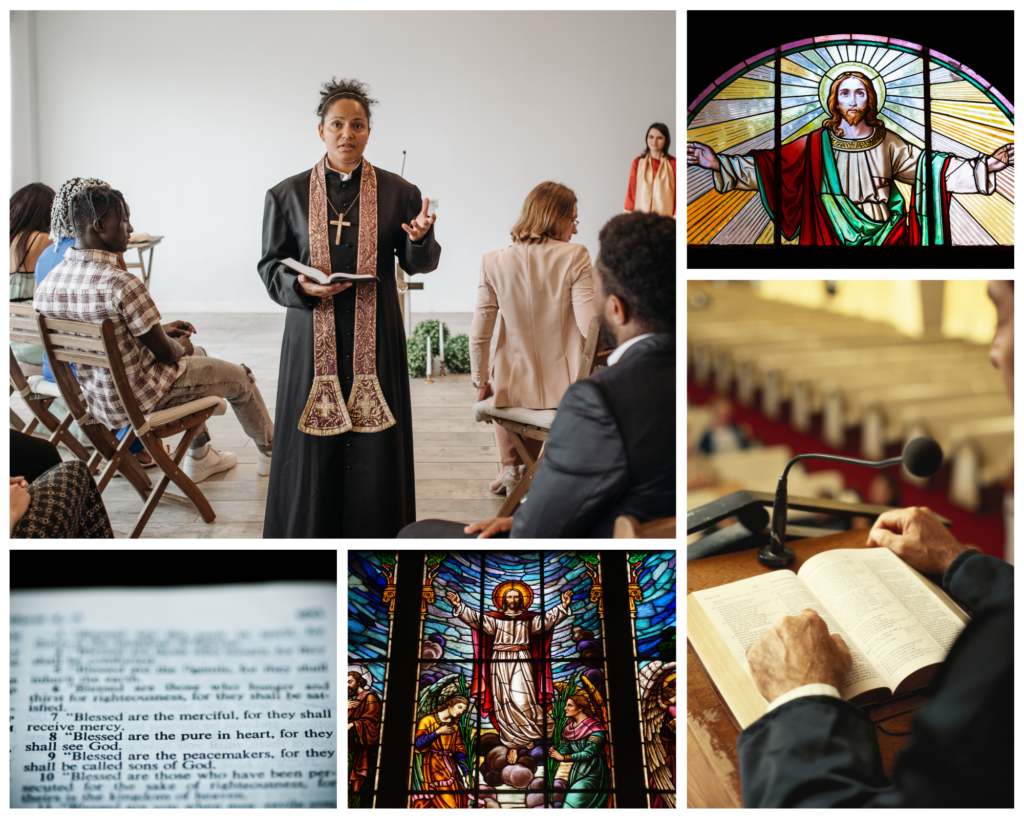
I’ve become convinced that theology only arises when people have lost touch with the Great Mystery. I just read in the summary section of Chapter One in the Catechism of the Catholic Church:
“We really can name God, starting from the manifold perfections of his creatures, which are likenesses of the infinitely perfect God, even if our limited language cannot exhaust the mystery” (CCC 48).
Now, within the same chapter, the CCC says, “God transcends all creatures. We must therefore continually purify our language of everything in it that is limited, image-bound or imperfect, if we are not to confuse our image of God – ‘the inexpressible, the incomprehensible, the invisible, the ungraspable’ – with our human representations. Our human words always fall short of the mystery of God” (CCC 42).
Let’s talk about language, our image of God, and the reality of Mystery.
A few months ago, I watched a documentary called Fantastic Fungi. A scientist in the film explained an interesting theory about language: psychoactive mushrooms helped hominids to evolve into Homo sapiens, language being a defining feature of the species. The scientist explained that psilocybin mushrooms create the experience of synesthesia, where two or more senses overlap in our perception. They said that language is really a type of synesthesia where sounds and visuals become connected, which was not the case before our hominid ancestors started consuming psychoactive fungi. To me, this was fascinating, the idea that fungi gave us language. The implication of this is that we are intrinsically caught up in the web of life, unable to be separated, try as we might, by our evolved abilities. It was a moment of humility for me to think that the one who taught my ancestors language is Mother Earth.
The nature of language is that it’s symbolic and rule-governed. Symbols have only the meaning we assign them, and the rules of language only work when we collectively agree on them. The word “fox” doesn’t mean anything to someone whose native language is something other than English. The word doesn’t inherently convey the reality of the red-furred, bushy-tailed animal that is stands for. Likewise, someone whose native language uses object-subject-verb construction may be confused by the rules of English grammar, where sentences are typically constructed as subject-verb-object. And for someone of another culture, the phrase “bring a dish to share” may, taken literally, seem to mean that the person should bring an empty plate because there aren’t enough of them rather than an entrée for others to try.
The thing about synesthesia is that the overlap of the senses is arbitrary. One person who smells colors is going to smell different things than another person who smells colors. A color doesn’t have a smell. A citrus fruit and a dragon lily smell very different, though they are similar in color. Every culture has its own group experience of language, and translating between those languages is quite difficult because the symbols of each language are arbitrary. Likewise, the rules for each language differ between cultures. The meaning and the organization of meaning lies within the collective consciousness of culture, made up of individual consciousnesses, thus further complicating things. This presents a bit of a problem if we hope to speak about God. How do we agree on meaning when there are cultural and individual meanings to navigate?
To adequately speak about God, if that is indeed something we want to do, we would have to come up with a universal language for over 8 billion people. After all, how else would we be able to collectively agree on meaning? We would all need the same symbols to mean the same things and for the symbols to work based on a universally shared set of rules. Homogeneity of language would be required for us to all share the same religious thinking, since language also shapes our thinking. There is, of course, the story in Acts where the Holy Spirit enables the disciples to speak in different languages so that those in the crowd all hear the gospel in their own language. I take this literarily, rather than literally, as the reversal of the Tower of Babel. But the Holy Spirit has, thus far in history, not put a universal language in our mouths.
I watched Arrival with my husband over his school’s winter break, which is about precisely this phenomenon of language shaping thought. The heroine of the film is a linguist given the assignment of decoding the language of newly arrived aliens. She uses a whiteboard, pictures, and demonstration to teach the aliens English, and the aliens share their symbols for the same words in their language. What’s so fascinating about the story is that, as she learns more of the aliens’ language, the linguist’s perception of time changes. She’s actually able to experience the future and the present simultaneously. When the aliens say, “There is no time,” it is first thought that they mean time is running out and war with them is impending. But the linguist, in learning their language, comes to understand that the human concept of time does not exist. Human language creates time. The aliens’ language breaks down all barriers between past, present, and future.
The nature of human language is that it is limited and places limitations upon our experience of the world around us. Language creates an illusory order, but if we tug on the threads of language even a little bit, the order we’ve tried so hard to create begins to unravel. Let’s take time. We say that at 6 A.M. we’ll wake up or that we’ll go to bed at 9 o’clock. We organize our day into twenty-four hours, each day having the same number of hours. Thus, we have a sense of time as incremental and fixed. Our ancient hunter-gatherer ancestors didn’t measure time in this fashion. When the sun rose, they woke up. When the sun set, they gathered around the fire for stories and rest. They noticed daylight increasing and decreasing and adjusted accordingly. As such, they experienced time not in increments, but in a continuous flow. There were no minutes and hours, only motion in space.
The nature of God, the Ultimate Reality, is that S/He is boundless, limitless, and totally free. At least, this is what theologians say. If that is true, the moment we begin to speak about God, we place the limitations of our language upon Something that has no limits. Therefore, the best our language can do is to point to the Reality. To try to name that Reality is already to be caught up in an illusion. Not only can our limited language not exhaust the mystery, its very attempts to describe the mystery can create an illusion in our minds as our words attempt to place into categories Something which defies all categories. Language doesn’t just fall short of the mystery. It can, at times, lead us further away from it.
Can we purify our language of everything that is limited, image-bound, and imperfect? This is, I think, a little bit of hubris. To believe that we can “purify” our language so that “we really can name God” seems to me precisely the mistake of the men in the story about the Tower of Babel. Our grasping at God using language is like people in a desert who talk about how good the water is in an oasis without quenching their thirst. They maybe even argue about how the water must taste, where the water came from, and whether this water can be known. Personally, I would rather drink the water than die of thirst talking about it. Maybe I’ll tell some people about the water so they can drink it, too, but my description of the oasis cannot adequately convey the relief my listeners will feel when they actually drink the cool water after walking through a hot desert. Sure, I could “really name” water. But naming water doesn’t mean I have tasted water. And naming water for others doesn’t mean they’ll taste it either.
The only appropriate way to speak about God, I think, is poetry and parable. Yeshua/Jesus was a poet and a storyteller, not a theologian. Take this section of Mark for example:
“No one sews a piece of unshrunken cloth
on an old cloak.
If he does, its fullness pulls away,
the new from the old,
and the tear gets worse.
Likewise, no one pours new wine
into old wineskins. Otherwise,
the wine will burst the skins,
and both the wine and the skins
are ruined.
Rather, new wine is poured
into fresh wineskins.”
Yeshua leaves much to interpretation, with many layers of meaning possible in his poetry and stories. His style is invitational, drawing you into his experience. Paul, on the other hand, was a theologian, and I think he missed the mark on things about half the time. He was trained as a Pharisee, and he attempted to fit his mystical experiences into theological categories, as was his training. I think he would be horrified to learn that his letters became Scripture. One of the great religious thinkers of the Catholic tradition, Saint Thomas Aquinas, attempted to build up a philosophy about God in his Summa Theologica. When he was finally touched by God, he said, “All I have written is straw.” Maybe we should take that seriously.
If God truly is “the inexpressible, the incomprehensible, the invisible, the ungraspable,” then what are we doing trying to name God at all? In Exodus, when Moses asks God what he should call Him, He says, “I am that I am.” Or, more accurately, “I will be who I will be.” God evades being named! And perhaps for good reason. Our need to name God seems to come from a need for control. Our language attempts to tame the wild God who incarnates as rainforest, ocean, stars, galaxies, and black holes. We say that God is the ground of Being, Being Itself, yet we continue to theologize rather than participate. Again, only poetry can do justice to mystery, since poetry invites participation.
I love haiku with its focus on nature. This one by Bashō is very poignant:
An old silent pond
A frog jumps into the pond—
Splash! Silence again.
The invitation here is to pay attention to the world around you and participate in it. To name something, we have to stand at a distance from it. The truth is, our distance is just an illusion. There is no real distance between us and the world and God. It’s all one continuum, world without end. This particular poem by Bashō also leads into my final thought for this post.
I have read the Tao Te Ching multiple times since I was thirteen. The very first chapter strikes me no matter how many times I read it:
“The tao that can be told
is not the eternal Tao.
The name that can be named
is not the eternal Name.
The unnamable is the eternally real.
Naming is the origin
of all particular things.
Free from desire, you realize the mystery.
Caught in desire, you see only the manifestations.
Yet mystery and manifestations
arise from the same source.
This source is called darkness.
Darkness within darkness.
The gateway to all understanding.”
In the Catholic tradition, we say that God is light. I prefer the God that is Holy Darkness. This Darkness cannot be described. Her womb is the Void in which the eternal dance of all life occurs. Only in this emptiness can there be manifestation. S/He makes room for it all. The eternal Name is No-Name. The language of this No-Name is silence. I say, just shut up and enjoy the dance. The rest of the universe is dancing. What if we stopped talking about it and joined the dance?


